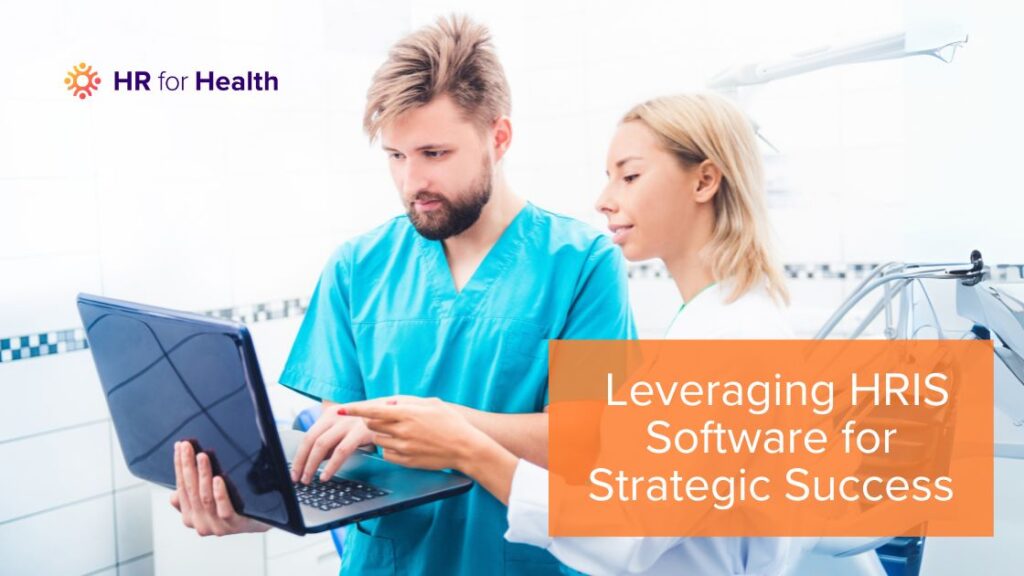Effective human resource management is essential to guarantee regulatory compliance, operational effectiveness, and quality patient treatment. Managing a sizable and varied workforce creates unique difficulties given the complexity of healthcare companies; these include high turnover rates, labor shortages, and compliance with often changing laws. Many healthcare companies are looking to human resource information systems (HRIS) software to help with these difficulties. HR solutions simplify HR procedures through data-driven decision-making, centralizing personnel data, and task automation.
Healthcare companies can modernize their HR processes, lower administrative loads, raise employee happiness, and maximize workforce management by using HRIS, therefore helping to contribute to strategic success and better patient outcomes.

The challenges of healthcare HR
Human resource management poses unique challenges for healthcare institutions. High turnover rates, particularly among nurses and other frontline workers, are among the most essential problems since they could cause staffing shortages, higher recruitment expenses, and a drop in the quality of treatment.
Coupled with this is the complexity of compliance and regulatory obligations, where healthcare HR must negotiate a tangle of rules about licensure, certifications, and labor laws—often changing at both state and federal levels. Furthermore, recruitment and retention remain key challenges as healthcare companies strive to attract and retain talented professionals in a competitive employment market.
According to Statista, about 56% of American HR managers asked in 2024 said they included telemedicine solutions into their yearly healthcare budget. Over half of the HR leaders added primary care, chronic illness management, mental and behavioral health, and care navigation to their healthcare budget.
Workforce planning and engagement are complicated, as managing different and sizable teams with varied skill sets, functions, and schedules requires effective coordination and a thorough awareness of employee needs. These elements, taken together, produce a complex environment requiring creative and practical HR answers.
Key features of HRIS systems in healthcare
Human resource information systems, or HRIS, give healthcare companies a set of practical instruments to simplify and maximize different HR operations.
Selecting the best HRIS systems becomes crucial as healthcare companies face increasing pressure for accuracy and efficiency. Correct HRIS software may simplify tasks, including personnel planning, payroll, compliance, and recruiting, directly influencing operational effectiveness.
Choosing the best HR solutions guarantees hospital HR departments can quickly satisfy regulatory needs, promote staff development, and enhance general workforce management.
The following are the main characteristics of HRIS software that are especially advantageous for the healthcare industry:
Employee data management
HRIS systems securely store employee data like personal information, job history, qualifications, certificates, and training records. HRIS keeps personnel information current and accessible in healthcare, where certification and licensure compliance is crucial.
This cuts administrative costs and lowers personnel record inaccuracies. HRIS systems can also track staffing changes, giving healthcare firms the latest workforce data.
Payroll and benefits administration
The various hours, overtime, and benefits arrangements complicate healthcare payroll and benefits management. HRIS systems automate computations, ensure proper payments, and manage taxes, insurance premiums, and retirement contributions to streamline payroll processing.
Benefits administration capabilities in HRIS systems let employees enroll, amend, and track their benefits. This ensures that healthcare employers can efficiently distribute benefits and keep employees compliant.
Performance tracking and appraisal
Employee performance management in healthcare is essential for meeting care standards and corporate goals. Managers can measure performance data, set targets, and conduct frequent appraisals with HRIS systems.
These methods help identify areas for growth, fill skill gaps, and promote professional development in healthcare, where staff performance directly affects patient care. Regular feedback and assessments keep personnel engaged and connected with company goals, thereby improving care outcomes.
Recruitment and onboarding modules
One of HR’s biggest concerns is recruiting and maintaining skilled healthcare workers. HRIS systems with integrated recruiting modules streamline hiring, from posting jobs and managing applications to scheduling interviews and background checks. The solution enables HR workers to track applications and ensure efficient compliance with healthcare employment standards.
The onboarding module automates document management, policy distribution, and training programs for new hires. This provides new personnel ready to support patients by settling in fast.
Scheduling and time management
Healthcare HR must manage complex and changing schedules. Advanced scheduling functions in HRIS systems optimize shift assignments, manage time-off requests, and assure compliance with labor rules, including overtime and rest intervals.
These solutions help healthcare businesses manage workloads and minimize burnout and staffing shortages. HRIS systems allow employees to self-manage their availability, switch shifts, and seek time off, enhancing flexibility and job satisfaction. Automated time tracking reduces administrative hassles and errors by appropriately compensating employees.
Benefits of implementing HRIS in healthcare
Healthcare firms benefit from HRIS implementation, which improves HR processes and strategic success. Here are the main benefits:
Improved operational efficiency
HRIS systems automate many laborious and time-consuming HR procedures. Healthcare HR departments can improve efficiency by automating payroll, benefits, and employee record-keeping.
Centralized data management frees HR professionals from administrative responsibilities, allowing them to focus on strategic tasks. HRIS also optimizes resource allocation with integrated capabilities like computerized scheduling and recruiting management, making healthcare operations smoother.
Enhanced compliance and reporting
Healthcare firms must follow strict certification, licensing, and working hour restrictions. By automating license renewals, certification dates, and necessary training, HRIS systems help ensure compliance.
Real-time alerts help HR departments meet regulatory standards. HRIS systems also enable sophisticated analytics and configurable reports for audits, labor law compliance, and decision-making. Automation and reporting lower the risk of non-compliance and penalties, helping healthcare firms keep their workforce safe and lawful.
Data-driven decision-making
HRIS systems turn raw data into valuable insights with advanced analytics. Healthcare HR professionals can view real-time staffing, performance, turnover, and absence statistics.
Healthcare firms can improve workforce management by examining this data and making evidence-based decisions. Predictive analytics can help HR organizations anticipate staffing shortages and employee churn. Data can also inform strategic HR activities like targeted training programs or recruitment campaigns, enhancing personnel productivity and alignment with business goals.
Reduced administrative workload
One of the most significant benefits of HRIS installation is reduced administrative workload. The system automates tasks such as tracking hours, processing payroll, handling employee benefits, and maintaining records.
This dramatically reduces administrative time and resources. HR professionals may concentrate on employee engagement, talent development, and strategic planning. Automating administrative operations reduces human error and improves accuracy and efficiency.
Better employee engagement and retention
In healthcare, fatigue and turnover are high; thus, employee engagement is vital. HRIS systems improve employee engagement by providing self-service portals for personal data, time off, benefits, and performance tracking.
Transparency and autonomy give workers ownership and enjoyment. HRIS solutions assist HR organizations in identifying training gaps, tracking career progression, and offering customized development. Healthcare organizations can reduce turnover, hiring, and training costs by identifying and meeting employee requirements.

Strategic applications of HRIS for healthcare HR
In addition to automation and efficiency, HRIS solutions can help manage the workforce strategically. HRIS’s enhanced capabilities allow healthcare HR personnel to make data-driven decisions, optimize operations, and empower their workforce to fulfill patient care needs.
The primary strategic applications of HRIS in healthcare HR are as follows:
- Predictive analytics for workforce planning: Predictive analytics is a powerful HRIS application in healthcare. HRIS systems can discover trends, patterns, and prospective difficulties in historical workforce data. It can foresee staffing shortages based on employee attrition, seasonal demand, and retirement trends.
These insights allow HR departments to design recruitment and retention strategies to ensure the proper skills and expertise are available for patient care. This helps HR professionals make more informed workforce expansion or restructuring decisions, avoiding reactive, short-term personnel solutions and achieving long-term operational success.
- Automated compliance tracking (e.g., license renewals, certifications): Compliance with licensure and certification standards is crucial in the highly regulated healthcare profession. HRIS solutions automate compliance tracking, ensuring healthcare firms never miss deadlines. The system may automatically track employee licenses, certifications, and mandatory training expiration dates and notify users of renewals or modifications.
This decreases compliance risks, maintains healthcare professional qualifications, and reduces HR administrative burdens. Automatic compliance tracking reduces the risk of fines, legal concerns, and patient care disruptions due to staffing lapses or unqualified staff.
- Customizing training and development plans: Healthcare firms need trained workers to adapt to changing medical practices and technologies. HRIS systems allow customization of training and development plans to promote professional growth. Tracking employee performance, certifications, and career goals with HRIS helps staff adapt development programs to specific training needs.
HRIS can offer training courses based on performance assessments or gap analysis to ensure staff have the latest skills and knowledge. Personalized training approaches boost job satisfaction, patient care, and retention by encouraging professional development.
- Optimizing staffing levels and schedules: In healthcare, patient demand fluctuates, and optimal care depends on appropriate staffing at all times. Another strategic use of HRIS systems is personnel and scheduling optimization. HR may optimize schedules to balance workload and decrease staffing shortages or overages using data-driven algorithms to examine staffing patterns, patient census data, and employee availability.
HRIS software may also plan based on employee skill sets, experience, and preferences, improving staffing efficiency and employee happiness. Scheduling automation lowers administrative work, prevents scheduling conflicts, and helps comply with labor rules like overtime and rest times.
Integrating HRIS Software with other healthcare systems
HRIS integration with other healthcare systems improves operational efficiency and departmental collaboration.
Synergy with electronic health records (EHR)
Integrating HRIS with EHR systems provides a holistic perspective of healthcare personnel and patient care. HRIS tracks healthcare workers’ qualifications, certifications, and training, whereas EHRs maintain patient data. HR can improve patient care and compliance by syncing these systems to assign key activities to skilled specialists. This interface enables HR departments to match personnel levels to patient care demands using real-time patient data.
Integration with payroll and finance systems
Linking HRIS to payroll and finance systems simplifies budgeting, payroll, and benefits administration. HRIS can automatically feed payroll systems hours worked, overtime, and benefits, eliminating errors and assuring appropriate payments. Integrated data can help finance managers anticipate labor expenses, optimize budgets, and determine workforce levels.
Streamlining patient care through HR alignment
When HRIS integrates with other healthcare systems, staffing decisions align with patient care goals. HR can optimize labor planning to meet variable patient demands by reviewing employee and patient data. By adequately staffing healthcare providers, this alignment improves care quality, burnout, and operational efficiency. Firms better meet real-time patient and employee demands by connecting HR, financial, and healthcare teams.
The strategic advantage of HRIS in healthcare
Using HR systems changes everything for healthcare companies trying to maximize HR management. HRIS software helps healthcare HR departments to increase operational efficiency, lower costs, and finally provide better patient care by automating essential operations, boosting compliance, and enabling data-driven decision-making.
Strategic uses, including predictive analytics, compliance monitoring, and ideal staffing, help further match HR practices with business goals. Schedule a meeting with our team to learn more about how adopting an HRIS system designed for small healthcare practices is crucial for ensuring long-term success and building a qualified, engaged workforce.


